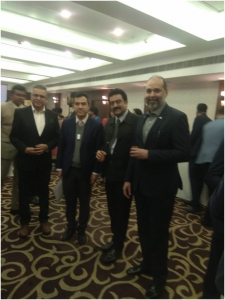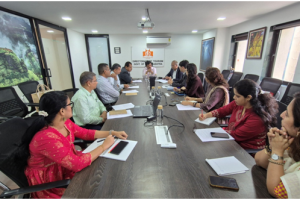BY TTT NEWS NETWORK
KOLKATA, 21 JANUARY 2023
Thailand Board of Investment and India and Thai Chamber of Commerce organised a seminar on “ Investment Opportunities in Thailand”, with support measures by the Thai government at Kolkata recently.

Mr. Pipayan Atipaya, acting consul general of Royal Thai Consulate General in Kolkata , Mr. Nanthapol Subanthad, Director and Consul, Thailand Board of Investment, India office , Mr. Raghav Goenka, President , Indo – Thai Chamber of Commerce, Kolkata, Mr. Rohit Surana, chief secretary, JITO and Executive Member, MCCI, Mr. Anil Punjabi, Chairman ( East) of Travel Agents Federation of India (TAFI), Mr. Manav Soni, Chairman ( East) of Travel Agents Association of India (TAAI), Mr. Sajid Ahmed Khan, head of Eastern India of Thai Airways etc were present in the seminar held at Hotel Hindustan International in Kolkata.
The key takeaways of the seminar were – government support measures and initiatives, Why Thailand – Thailand business advantages, investment opportunities for Indian companies in the focus sector etc.
The seminar has been organised to know more about what Thailand has to offer foreign companies in the focus sectors and why it is poised for growth in these sectors. The interactive programme was followed by the question and answer session.

ECONOMY IN THAILAND
The economy of Thailand is dependent on exports, which accounted in 2019 for about sixty per cent of the country’s gross domestic product (GDP). Thailand itself is a newly industrialized country, with a GDP of 16.316 trillion baht (US$505 billion) in 2018, the 8th largest economy of Asia, according to the World Bank. As of 2018, Thailand has an average inflation of 1.06% and an account surplus of 7.5% of the country’s GDP. The Thai economy was expected to post 3.8% growth in 2019. Its currency, the Thai Baht, ranked as the tenth most frequently used world payment currency in 2017.

The industrial and service sectors are the main sectors in the Thai gross domestic product, with the former accounting for 39.2 percent of GDP. Thailand’s agricultural sector produces 8.4 percent of GDP—lower than the trade and logistics and communication sectors, which account for 13.4 percent and 9.8 percent of GDP respectively. The construction and mining sector adds 4.3 percent to the country’s gross domestic product. Other service sectors (including the financial, education, and hotel and restaurant sectors) account for 24.9 percent of the country’s GDP. Telecommunications and trade in services are emerging as centers of industrial expansion and economic competitiveness.
Thailand is the second-largest economy in Southeast Asia, after Indonesia. Its per capita GDP (US$7,273.56) in 2018, however, ranks fourth in Southeast Asian per capita GDP, after Singapore, Brunei, and Malaysia. In July 2018, Thailand held US$237.5 billion in international reserves, the second-largest in Southeast Asia (after Singapore). Its surplus in the current account balance ranks tenth of the world, making US$37.898 billion to the country in 2018. Thailand ranks second in Southeast Asia in external trade volume, after Singapore.

The nation is recognized by the World Bank as “one of the great development success stories” in social and development indicators. Thailand is one of the countries with the lowest unemployment rates in the world, Tourism is one of the key sectors of Thailand.

Advertisement:





























Add Comment